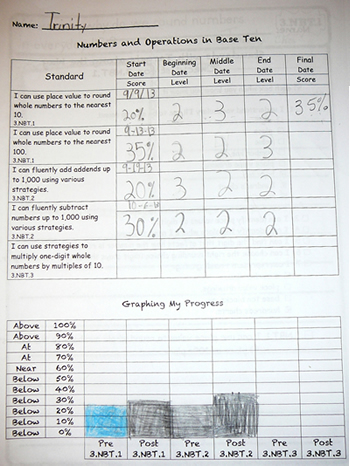 Colleagues from all over the Denver metro area gather and wander around Greg’s room — talking, looking, reading, handling and taking pictures. As the group settles, there is a quick review of this month’s agenda and then the sharing begins. Greg, a 6th grade social studies teacher, is hosting this month’s Teacher Learning Community (TLC) meeting. He introduces participants to student- and teacher-created artifacts from around the room and the group probes deeper into their purpose, use and effectiveness. One by one, participants share about the formative assessment strategies they focused on this past month and reflect on what has worked (and not worked) in their classrooms. Greg has a new progress monitoring form he wants to share with his colleagues, along with a short audio clip of students sharing their learning targets.
Colleagues from all over the Denver metro area gather and wander around Greg’s room — talking, looking, reading, handling and taking pictures. As the group settles, there is a quick review of this month’s agenda and then the sharing begins. Greg, a 6th grade social studies teacher, is hosting this month’s Teacher Learning Community (TLC) meeting. He introduces participants to student- and teacher-created artifacts from around the room and the group probes deeper into their purpose, use and effectiveness. One by one, participants share about the formative assessment strategies they focused on this past month and reflect on what has worked (and not worked) in their classrooms. Greg has a new progress monitoring form he wants to share with his colleagues, along with a short audio clip of students sharing their learning targets.
Third grade teacher Lyn shares a recent project in which her students supported kindergartners in identifying learning targets and goals for those targets. The group considers whether this project might be adapted at the high school level. Conversation then moves to last month’s discussion of feedback and how the teachers assembled have used them. They then discuss an article about feedback to continue the topic; lively dialogue ensues. The meeting closes with specific requests by teachers to get “extra” time next month for feedback on how they are giving input to students. Teachers were so engaged in the conversation that no one minded extending the planned meeting by 30 minutes.
The TLC – a Well-Honed Format for Teacher Professional Development
Welcome to a formative assessment TLC. In it, teachers gather together to learn more about formative assessment, both from and with each other. The protocol used to guide this process is loose but consistent and allows participating educators to share, ask clarifying questions and give and get feedback. These TLCs meet many of the conditions for successful job-embedded professional development suggested by researchers. John Hattie (2009), for example, recommends learning opportunities that extend over time, involve external experts, engage teachers sufficiently in learning, and include processes with an effect on student learning such that teachers’ discourse and ideas about learning are challenged and supported by school leadership. TLCs meet over time; the “external expert” can be a person, article, video, etc.; teachers are challenged and engaged in changing their instructional practice; and getting support from school leadership means you would not be “the only one” and the work would be valued.
TLCs are often established within one school or district. The group described above met for three years and spanned the Denver metro area and beyond. They came from new schools, old schools, large schools and small schools representing suburban, semi-urban and rural. The commonality of the group was an insatiable curiosity about formative assessment.
Professional learning groups transform instructional practice and foster a culture of learning and student achievement within a school. Particularly in the arena of formative assessment, structured collaboration with colleagues on an ongoing and regular basis is important to help teachers expand their thinking, change their practice and provide some cognitive dissonance and an appropriate tension regarding instructional practice. Teacher-led learning is important to changing teachers’ behaviors and helping them get better at what they do.
In my next blog, I’ll share the building blocks of an effective formative assessment Teacher Learning Community, so come back again soon!